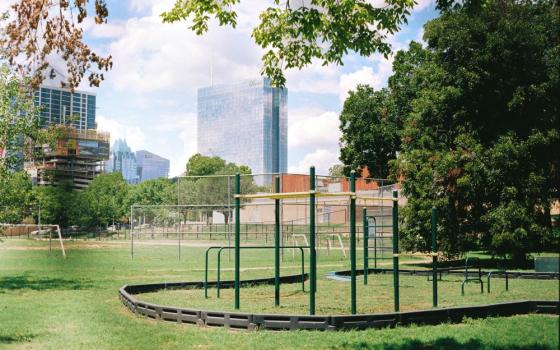A young earthquake survivor stands amid the debris of a destroyed building in Aleppo, Syria, Feb. 7, 2023. Aleppo, devastated after the horrendous earthquake that struck the morning of Feb. 6, is trying to pick up the pieces after the shock of the catastrophe. Local bishops are calling the situation "desperate" and the earthquake itself "biggest terror." (OSV News photo/Firas Makdesi, Reuters)
It seemed that 12 years of a bloody war should have been enough tragedy for the people of Aleppo and other Syrian cities. But in the early hours of Feb. 6, a devastating earthquake struck northwestern Syria, killing 1,500 as of 5 a.m. Eastern on Feb. 7.
In southern Turkey and Syria combined, the death toll reached more than 5,000 as of early morning hours on Feb. 7 and is expected to rise as people are still trapped under the rubble.
In Aleppo, people are trying to pick up the pieces after the shock of the catastrophe.
"It’s a desperate humanitarian situation," Chaldean Catholic Bishop Antoine Audo of Aleppo, and former president of Caritas Syria, told OSV News.
Even before the catastrophe, there were electricity and fuel shortages in Syria's second-largest city of more than 2 million people.
"There is no electricity, there is no fuel, the winter is very harsh, and it is cold inside and outside. There is so much poverty," Audo said, underlining that "on top of all that, we have to face this earthquake. It's not easy. The situation is really terrible."
By early morning on Feb. 6, following the earthquake, the bishopry (bishop's residence where offices are often located) was hosting about 50 people, including children: "We prayed together, and we had some tea."
Audo explained that people who live on the above-ground floors in apartment buildings do not feel safe. "It is dangerous, especially if there is another earthquake or aftershocks." In fact, a second earthquake struck early afternoon on Feb. 6.
The Chaldean Catholic bishop said the churches of different rites are organizing centers to provide food and water. "This is the first step of help in this tragedy," he said.
After almost 12 years of a deadly war in Syria, the earthquake came on top of the suffering its people had already experienced.
"I am from Aleppo, and it's the first time I experienced a dangerous tragedy of an earthquake," said the 77-year-old bishop. "I thought it was the end for me."
Maronite Bishop Joseph Tobji of Aleppo referred to the earthquake as "the biggest terror."
"I didn’t experience anything like this in all the years of war," Tobji told OSV News. "People are shocked and crying," he said.
"We are welcoming people in the bishopry, in the cathedral and in the parishes," he said, adding that they are "buying food to help the people." By the afternoon of Feb. 6, the Maronite Cathedral of Saint Elijah in Aleppo was hosting around 150 people.
"Our people have suffered for 12 years now because of the war, because of the sanctions. I have always pleaded to the world to have mercy on our people."
Sandy Agob, a 29-year-old Maronite Catholic from Aleppo, told OSV News that since 4 a.m., when the earthquake struck, they were "living in horror."
"I'm so scared, but thank God we are okay," said Agob, who lives with her parents in a ground-floor apartment. "Today was the worst day ever. Worse even than the war. You realize that in a single moment, there’s just a thread between your life and death," she added.
Shaken by the earthquake, Agob shared what she told her parents immediately after the tragic shock: "Why do people (in the world) have problems with each other, while life is so fragile that it can be just taken away in seconds?"
Sleeping at the time of the earthquake, Agob said she heard her parents shouting to come to them and that in their apartment, "everything was moving and broken."
The first quake, which she said lasted four minutes, "was so long." They "couldn't stand up, so we sat on the floor" in the entryway to the bathroom, trying to keep safe, Agob said.
Advertisement
"I kept praying, praying, praying, holding a picture of Jesus and Mary. Thank God, He protected us," she said. Hearing the crashing sounds of stones falling outside, Agob recounted that she thought: "We are going to be killed."
"But God saved us," she said.
After five minutes, they felt another quake, not as strong, lasting about 30 seconds.
She and her mother dressed quickly, her father still in his pajamas. "I thought we might never come back to our home" if it got destroyed. Grabbing their important documents, they rushed to their car and drove to an area not surrounded by buildings, staying there until 7 a.m., then returning home.
She noted that her friend, who lives on the sixth floor of a building, in which the earthquake was felt even stronger, ran outside in the rain without any shoes.
By 8 a.m., Agob arrived at the bank where she works. "I thought, 'let's go to work, maybe it's a safer place,' but it was not" -- and by 1:30 p.m., she was back home.
On her way to the bank, Agob saw demolished buildings, fallen balconies and the collapsed minaret of a mosque. "I saw people running, on foot, and driving in their cars," she said, recounting the frantic reaction all around her.
What makes people even more fearful, she said, is the fragility of Aleppo's buildings after enduring years of shelling and bombing. "We're afraid that our buildings can't support anymore from this earthquake."
While the power in Aleppo typically comes on for two hours a day, Agob's family has had no electricity in the last three days. Typically households use kerosene heaters in the city but amid the fuel shortage, her parents were rarely able to use their own in the last days to even slightly take the chill out of their home. "We wear many layers of clothes," she pointed out.
"I really don't know why God is testing us with this earthquake, because we had enough problems in the war," Agob said of the catastrophe. "We hope to live peacefully and not to be afraid of losing our life," she added.
The Middle East Council of Churches (MECC) held an emergency meeting in Beirut on Feb. 6 to discuss the current situation and how to respond to the earthquake’s repercussions.
"We call on the international community and the international ecumenical family to provide urgent emergency aid to the region, in coordination with the Middle East Council of Churches, the Churches and their affiliated institutions," the MECC said in a statement.
"We urge the immediate lifting of sanctions on Syria and allowing access to all materials, so sanctions may not turn into a crime against humanity," the MECC implored.
Syria has been under international sanctions since the beginning of the war. Since the uprisings began in March 2011, "the U.S. government has intensely pursued calibrated sanctions to deprive the regime of the resources it needs to continue violence against civilians and to pressure the Syrian regime to allow for a democratic transition as the Syrian people demand," the U.S. State Department stated on its website.
The Pontifical Mission Societies in the United States has opened the Earthquake Aid for Turkey and Syria Fund "to provide immediate relief to the families that suffered catastrophic loss due to the earthquake that shook Turkey and Syria Monday morning," the organization said in a statement.
Proceeds from the fund will support missionary priests, religious women and lay missionaries on the ground providing assistance to those impacted by the disaster, defined by Audo as a "tremendous bomb."
"While it is too early to know the full extent of the devastation wrought by the earthquake, experience tells us that the days ahead will be critical," Msgr. Kieran Harrington, national director of The Pontifical Mission Societies USA, said in a statement.
"Missionaries are ready to help, and the national director in Turkey is already working with local NGOs to ensure that every dollar sent goes directly to those most impacted by this tragedy," he added.
The Pontifical Mission Societies USA will distribute grants through Catholic dioceses and trusted partner organizations to ensure that the funds fully benefit the immediate and ongoing needs of communities impacted by the devastating earthquake.







